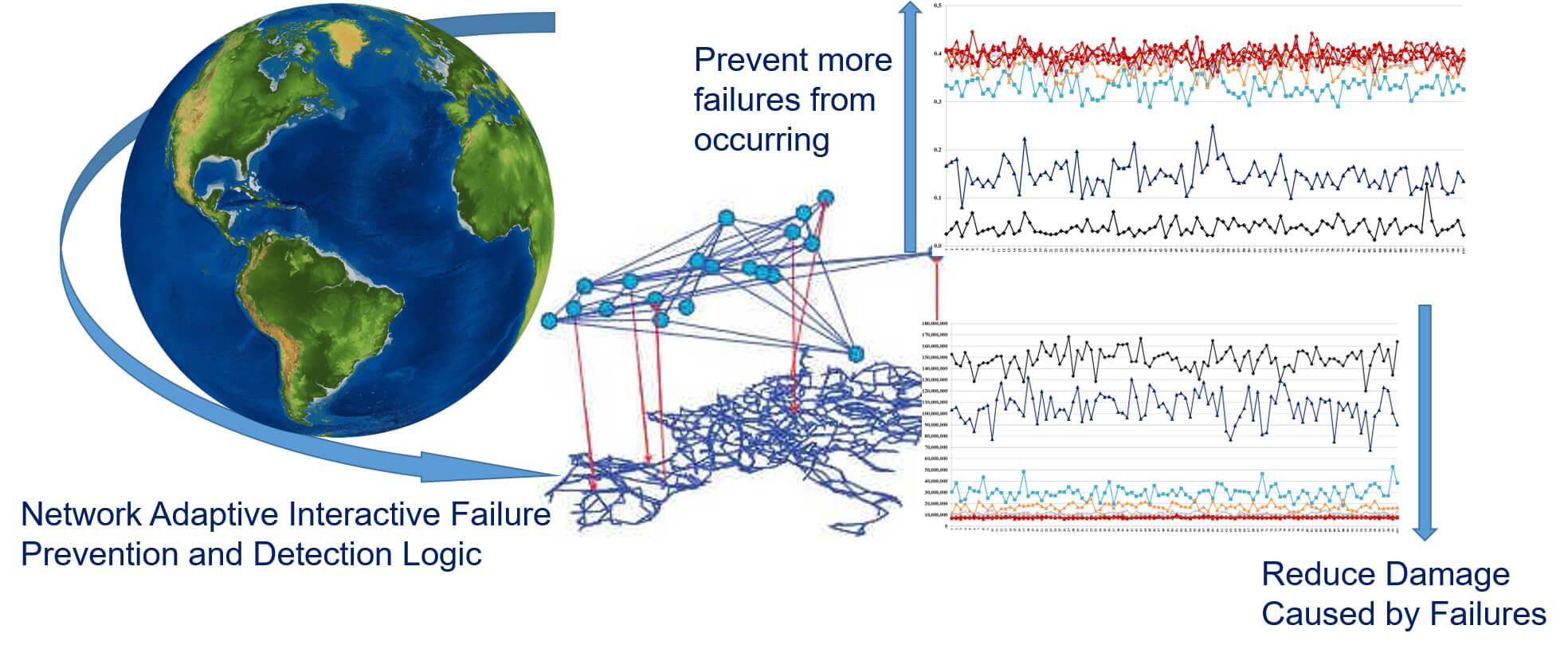May 21, 2020
Patented technology designed to stop tiny errors from crashing large health care, supply chain systems
 Purdue University innovators have come up with a set of patented algorithms that predict, identify, diagnose and prevent abnormalities in large and complex systems. (Image provided
Download image
Purdue University innovators have come up with a set of patented algorithms that predict, identify, diagnose and prevent abnormalities in large and complex systems. (Image provided
Download image
WEST LAFAYETTE, Ind. – The COVID-19 pandemic has forced public health, supply chain, transportation, government, economic and many other entities to interact in real time. One of the challenges in large systems interacting in this way is that even tiny errors in one system can cause devastating effects across the entire system chain.
Now, Purdue University innovators have come up with a possible solution: A set of patented algorithms that predict, identify, diagnose and prevent abnormalities in large and complex systems.
“It has been proven again and again that large and complex systems can and will fail and cause catastrophic impact,” said Shimon Y. Nof, a Purdue professor of industrial engineering and director of Purdue’s PRISM Center. “Our technology digests the large amount of data within and across systems and determines the sequence of resolving interconnected issues to minimize damage, prevent the maximum number of errors and conflicts from occurring, and achieve system objectives through interaction with decision makers and experts.”
Nof said the Purdue technology would be helpful for smart grids, health care systems, supply chains, transportation systems and other distributed systems that deal with ubiquitous abnormalities and exceptions, and are vulnerable to cascading or large amount of failures.
This technology integrates constraint modeling, network science, adaptive algorithms and state-of-the-art decision support systems.
“Our algorithms and solution apply systems science and data science to solve problems that encompass time, space and disciplines, which is the core of industrial engineering,” said Xin Chen, a former graduate student in Nof’s lab who helped create the technology.
Nof said the novelty of the technology lies in three main areas. First, analytical and data mining tools extract underlying network structures of a complex system and determine its unique features. A robust set of algorithms then are analyzed based on the objectives for system performance, structures and features of fault networks in the system. Finally, algorithms with specific characteristics are applied to manage errors and conflicts to achieve desired system performance.
The innovators are working with the Purdue Research Foundation Office of Technology Commercialization to license this patented technology. The office recently moved into the Convergence Center for Innovation and Collaboration in Discovery Park District, adjacent to the Purdue campus.
The researchers are looking for partners to continue developing their technology. For more information on licensing and other opportunities, contact Dhananjay Sewak of OTC at dsewak@prf.org and mention track code 65241.
This technology is part of the team’s work at Purdue’s PRISM Center, focused on production, robotics and integration software for manufacturing and management.
About Purdue Research Foundation Office of Technology Commercialization
The Purdue Research Foundation Office of Technology Commercialization operates one of the most comprehensive technology transfer programs among leading research universities in the U.S. Services provided by this office support the economic development initiatives of Purdue University and benefit the university's academic activities through commercializing, licensing and protecting Purdue intellectual property. The office recently moved into the Convergence Center for Innovation and Collaboration in Discovery Park District, adjacent to the Purdue campus. In fiscal year 2019, the office reported 136 deals finalized with 231 technologies signed, 380 disclosures received and 141 issued U.S. patents. The office is managed by the Purdue Research Foundation, which received the 2019 Innovation and Economic Prosperity Universities Award for Place from the Association of Public and Land-grant Universities. In 2020, IPWatchdog Institute ranked Purdue third nationally in startup creation and in the top 20 for patents. The Purdue Research Foundation is a private, nonprofit foundation created to advance the mission of Purdue University. Contact otcip@prf.org for more information.
About Purdue University
Purdue University is a top public research institution developing practical solutions to today’s toughest challenges. Ranked the No. 6 Most Innovative University in the United States by U.S. News & World Report, Purdue delivers world-changing research and out-of-this-world discovery. Committed to hands-on and online, real-world learning, Purdue offers a transformative education to all. Committed to affordability and accessibility, Purdue has frozen tuition and most fees at 2012-13 levels, enabling more students than ever to graduate debt-free. See how Purdue never stops in the persistent pursuit of the next giant leap at purdue.edu.
Writer: Chris Adam, 765-588-3341, cladam@prf.org
Sources: Shimon Nof, nof@purdue.edu
Xin Chen, xchen@siue.edu

